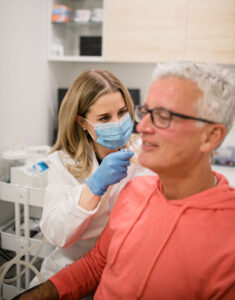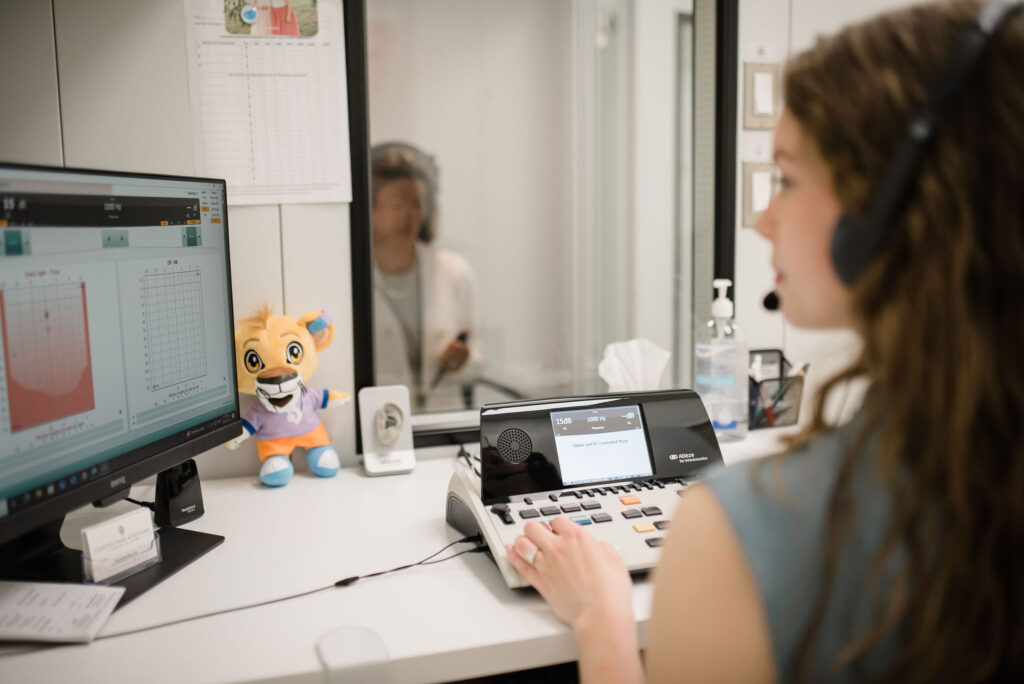Hearing loss often develops slowly, making it easy to miss. On average, people wait 7 to 10 years after first noticing symptoms before booking a hearing test (Davis et al., 2007). That’s a long time to miss out on conversations, laughter, and family moments.
If you’ve been wondering whether it’s time to see an audiologist, here are seven signs that a hearing test in Halifax could help.
7 Signs You May Need a Hearing Test
1. Difficulty following conversations in noise
If you find restaurants or family gatherings overwhelming, it may be an early sign of hearing loss, especially for high-pitched sounds like “s” and “th” (Kramer et al., 2006).
2. Turning up the TV louder than others prefer
If your family or friends complain about the volume, it may be time to check your hearing.
3. People sound like they “mumble”
Often, the issue isn’t with others’ speech, it’s with your ability to pick up certain frequencies clearly.
4. Ringing or buzzing in your ears (tinnitus)
Tinnitus is commonly linked to hearing loss or earwax buildup and is worth investigating with a professional.
5. Avoiding social activities
Untreated hearing loss can lead to withdrawal from conversations and social events. Over time, this has been linked to higher risks of isolation and even cognitive decline (Livingston et al., 2020).
6. Feeling tired after listening
When hearing is difficult, your brain works overtime to fill in the gaps, a phenomenon called “listening fatigue” (Pichora-Fuller et al., 2016).
7. A history of loud noise exposure
Musicians, construction workers, or people who listen to loud music through earbuds are at higher risk of permanent hearing damage (Nelson et al., 2005).
Why Early Hearing Tests Matter
Untreated hearing loss isn’t just an inconvenience, it’s linked to memory problems, faster cognitive decline, and reduced quality of life (Lin et al., 2013). The good news? Early testing and treatment can help keep your brain sharp, your conversations enjoyable, and your lifestyle active.
What to Expect at a Hearing Test in Halifax
At Clayton Park Audiology, a hearing test is simple and comfortable. It includes:
Case history – your hearing concerns and health background
Ear exam – checking for wax buildup or ear health issues
Middle ear testing – measuring ear drum movement and middle ear pressure
Hearing test – measuring the quietest sounds you can hear
Speech testing – seeing how well you understand words in quiet and in noise
You’ll get a copy of the test results and recommendations tailored to your needs.
FAQs
How often should I have a hearing test?
Adults over 55 should be tested every 1–2 years. Younger adults should be tested every 5-10 years or sooner if they notice changes or have risk factors for hearing loss.
Is the test covered by insurance?
Some health insurance plans cover audiology services. Our team can help you check your coverage.
What if my hearing is normal?
That’s great news! A baseline test will still be useful for future comparisons.
Take the First Step Today
If you’ve been searching for a hearing test in Halifax or wondering, “is there an audiologist near me?”, we’d love to help. Call 902-405-0515 or book online at cpaudiology.ca to schedule your assessment.
References
-
Davis A, et al. (2007). Hearing impairment in middle age: a population study of the burden of illness. Ear Hear.
-
Kramer SE, et al. (2006). The impact of hearing loss on daily life. Ear Hear.
-
Lin FR, et al. (2013). Hearing loss and cognitive decline in older adults. JAMA Intern Med.
-
Livingston G, et al. (2020). Dementia prevention, intervention, and care: 2020 report. Lancet.
-
Nelson DI, et al. (2005). The global burden of occupational noise-induced hearing loss. Am J Ind Med.
-
Pichora-Fuller MK, et al. (2016). Hearing impairment and cognitive energy: The Framework for Understanding Effortful Listening (FUEL). Ear Hear.

Author
Lyndsay Bozec
REGISTERED AUDIOLOGIST, NSCASLP
Lyndsay is a passionate advocate for hearing health awareness and hearing preservation. Over the years she has delivered various hearing health presentations and hearing aid workshops for caregiver workshops across HRM.

